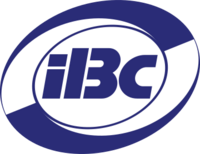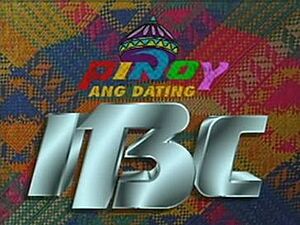Intercontinental Broadcasting Corporation facts for kids
 |
|
| Private (1959–1986) State agency (1986–present) |
|
| Industry | Entertainment (1960–1986) State media (1986–present) |
| Founded | October 1, 1959 |
| Headquarters | IBC Compound, Lot 3-B, Capitol Hills Drive cor. Zuzuarregui Street, Barangay Matandang Balara, Diliman,
,
Philippines
|
|
Area served
|
Nationwide |
|
Key people
|
|
| Products | Television program |
| Services | Broadcasting Radio Television Streaming |
| Owner |
|
|
Number of employees
|
178 |
| Parent | Presidential Communications Office (1986–present) |
| Divisions | IBC News and Public Affairs |
| Type | Broadcast commercial radio and television network |
|---|---|
| Country | Philippines |
| Broadcast area | Nationwide |
| Programming | |
| Language(s) | Filipino (main) English (secondary) |
| Picture format | 16:9 1080i HDTV |
| Ownership | |
| Owner | Government of the Philippines (Presidential Communications Office) |
| Parent | Intercontinental Broadcasting Corporation |
| Sister channels | PTV |
| History | |
| Launched | October 1, 1959 (test broadcast) March 1, 1960 (official) |
| Founder | Dick Baldwin |
| Former names | Inter-Island Broadcasting Corporation (1960–1975) Islands TV-13 (1990–1992) |
Intercontinental Broadcasting Corporation (IBC) is a Philippine TV and radio network. It broadcasts for free across the country from Quezon City. IBC is owned by the Philippine government through the Presidential Communications Office (PCO).
IBC was once known as "The Kaibigan Network," which means "friend" in Filipino. This slogan was used from 2019 to 2023. Now, it shares the government slogan "Bagong Pilipinas" with PTV.
IBC works with other government media companies like PTV and the Presidential Broadcast Service-Bureau of Broadcast Services. Together, they form the media part of the PCO. IBC's main job is to show programs about education, culture, arts, and sports. Its main offices and studios are in Quezon City.
As a government station, IBC gets money from the national budget. It also earns money from companies that buy time to show their programs or advertisements. IBC also runs two digital TV channels: Congress TV and DWAN 1206 TV.
Contents
History of IBC
How IBC Started
The company first began as Inter-Island Broadcasting Corporation on October 1, 1959. Its TV station, DZTV Channel 13 in Manila, started its test broadcasts then. On March 1, 1960, at 6:30 pm, DZTV-TV 13 officially launched. It was the third TV station in the Philippines.
The first owner was an American businessman named Dick Baldwin. Most of the early shows were foreign programs from the American TV network CBS, along with some local shows. The station was first located in San Juan.
In 1962, Andrés Soriano Sr. of San Miguel Corporation bought the network. He also owned Radio Mindanao Network (RMN) and The Philippine Herald newspaper. This made his company the first to own TV, radio, and a newspaper in the Philippines. IBC worked with RMN radio stations to cover elections. It also built relay transmitters to send its programs to viewers in Cebu and Davao.
Between 1970 and 1972, IBC started broadcasting in color, calling its system "Vinta Color." It was the third network in the Philippines to do so. In September 1972, President Ferdinand Marcos declared martial law. This caused most TV and radio networks to shut down. However, IBC was allowed to broadcast again a few months later.
The Benedicto Years
On February 1, 1975, Roberto Benedicto bought the network from the Soriano group. This was because of a rule that said only Filipino-owned companies could own media. The company's name changed to Intercontinental Broadcasting Corporation. That same year, IBC launched an FM radio station, DWKB-FM.
By 1976, IBC became one of the most-watched TV networks. It had popular shows like the Metro-Goldwyn-Mayer Tarzan films and comedy shows such as Iskul Bukol, Chicks to Chicks, and T.O.D.A.S.: Television's Outrageously Delightful All-Star Show.
In July 1978, IBC moved to its current home at Broadcast City in Quezon City. Its sister networks, RPN and BBC, also moved there. IBC also built a new transmitter for clearer TV signals. By 1985, IBC was still very popular, even though RPN had become the top network.
After the EDSA Revolution
In 1986, the People Power Revolution (also called the EDSA Revolution) happened. This led to Corazon Aquino becoming the new president. After this, IBC, RPN, and BBC were taken over by the government. They were said to be connected to the previous government. A group was created to manage all three networks.
When IBC became a government channel, it got a new logo and the slogan "Basta Pinoy sa Trese" (Just Filipino on Thirteen). President Aquino then gave IBC and RPN to the Government Communications Group. BBC's Channel 2 was given to ABS-CBN. When BBC closed, many of its employees joined IBC and RPN. This caused IBC's costs to go up.
In 1987, IBC changed its slogan to "Life Begins at 13." By this time, IBC was finding it hard to compete with other networks, especially ABS-CBN, which became number one. Some of IBC's popular shows moved to other channels. The cost of making shows and paying talents also increased, making it hard for IBC to produce its own programs, except for news and special events.
In 1989, IBC tried a new slogan, "Pusong Pinoy, Pusong Trese" (Heart of Filipino, Heart of Thirteen). However, advertising support decreased because of the changes in ownership and management. Still, famous singer Nora Aunor joined IBC, and her show Superstar relaunched on the network.
Islands TV-13 Era
By 1990, IBC 13 was last in the TV ratings. In October 1990, a company called Islands Broadcast Corporation took over managing IBC 13. The network was renamed Islands TV-13. Its new slogan was "The Newest Network."
In November 1990, IBC became a fully government-owned station. This happened through an agreement between the government and Roberto Benedicto.
However, the new management caused problems, and the network's ratings and income suffered. In March 1993, a court ordered Islands Broadcast Corporation to stop managing IBC 13 because they had not paid their debts. Popular shows during this time included Choudenshi Bioman and Hikari Sentai Maskman.
Return to IBC and New Partnerships
In October 1992, Islands TV-13 went back to being called IBC. The network's own board of directors took over management again.
On May 27, 1994, IBC launched a new slogan, "Pinoy ang Dating" (Filipino Styled). Even with limited money, the programs got better. IBC started broadcasting its shows across the country using satellites. Soon after, IBC reached fourth place in primetime ratings.
In 1996, Vintage Enterprises moved its shows to IBC. This included the PBA games and Blow by Blow. These shows helped IBC-13 move to third place in primetime ratings. IBC also improved its transmitter for clearer TV reception. In 2000, Viva Entertainment bought Vintage Enterprises. The sports and entertainment block on IBC was renamed Viva TV and continued until 2002.
On September 2, 2000, IBC was given permission to broadcast for another 25 years. That same year, IBC had a big success with the Philippine version of Who Wants to Be a Millionaire?.
On January 1, 2002, IBC launched a new logo and slogan, "New Face, New Attitude." However, in early 2003, Viva TV on IBC ended. This was because Viva decided not to continue their agreement with IBC due to high costs and low ratings.
On December 12, 2003, IBC launched another new logo and slogan, "Ang Bagong Pilipino" (The New Filipino).
Challenges and Privatization Efforts
After many years, IBC-13's studios and equipment became old and broken. The network faced financial problems and could not afford to keep up its operations. Many employees lost their jobs, and the network owed money to its workers. In 2016, IBC had about 200 employees.
There were several plans to sell IBC and make it a private company. In 2011, IBC made an agreement with Prime Realty to develop its Broadcast City property. The government wanted to privatize both RPN and IBC, keeping only People's Television (PTV) as the government's TV network.
AKTV and Other Blocktime Deals
IBC signed an agreement with TV5's sports division, Sports5, to air live sports. This sports block was called AKTV and launched on June 5, 2011. IBC also launched a new logo and slogan, "Where the Action Is."
However, in April 2013, AKTV decided not to continue its agreement with IBC. This was due to high costs and low ratings.
In 2014, IBC signed a deal with Asian Television Content Corporation for a new primetime block. But these programs stopped airing on August 31, 2014, possibly because of low ratings and lack of advertisers.
The government continued to plan for IBC's privatization. In January 2016, President Aquino approved the plan to sell IBC. The money from the sale would go to PTV-4 to help it upgrade. Several business groups showed interest in buying IBC.
In March 2017, IBC broadcasted with a low-powered signal. In October 2017, it began testing digital TV broadcasts.
Recent Changes and Future Plans
In late 2018, IBC started to improve its facilities and programs. The network moved its studios and offices to a new building in Quezon City. This was to make way for a new condominium project on the old Broadcast City property. IBC also upgraded its analog transmitter.
On February 11, 2019, IBC announced big changes to its programs. This included showing reruns of old IBC shows, documentaries, and sports content. IBC also created two new slogans: "Iconic.Bold.Chill" and "Kaibigan Mo!"
In March 2020, IBC stopped some of its regular programs due to the COVID-19 pandemic in the Philippines. Instead, it aired government briefings about the pandemic.
In May 2020, the government announced that IBC would be used to air educational television programs for the Department of Education's DepEd TV block. Test broadcasts started in August 2020, and official broadcasts began on October 5, 2020, the start of the school year. However, DepEd TV stopped broadcasting on IBC in June 2022.
In December 2021, IBC made a deal to air games from the Maharlika Pilipinas Basketball League (MPBL).
In March 2022, the network changed its broadcast to a widescreen format. This made the viewing experience better for people with widescreen TVs. On March 18, 2022, IBC began digital test broadcasts on UHF Channel 17.
In September 2022, IBC announced that it might stop operations in 2023 due to financial problems. Employees asked the government for funds to continue broadcasting and to pay retired staff. The government allotted money from the 2023 National Budget for IBC to continue its operations and pay salaries.
On January 31, 2023, the House of Representatives renewed IBC's franchise for another 25 years, allowing it to operate until 2050.
On July 3, 2024, the radio feed of DWAN 1206 was added as one of IBC's digital subchannels. On August 12, 2024, IBC signed an agreement with The Manila Times. On October 1, 2024, Congress TV was added as IBC's second digital subchannel.
IBC Programs
IBC Stations Nationwide
See also
- List of Philippine media companies
- Philippine television networks
- Television channels
- People's Television Network
- Presidential Broadcast Service
- Radio Philippines Network



